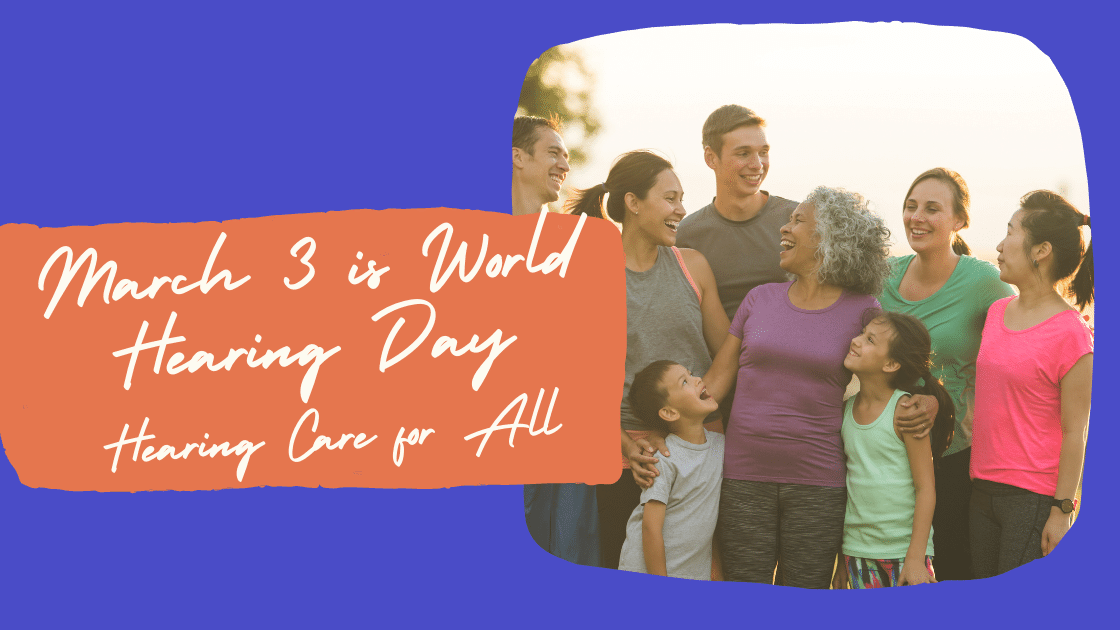- Common Hearing Aid Problems & How to Fix Them - June 14, 2021
- Why People Avoid Treating Hearing Loss — and Why You Should Schedule a Hearing Test! - May 21, 2021
- Common Hearing Aid Problems & How to Fix Them - May 14, 2021
World Hearing Day is the largest global campaign on hearing health! Organized by the World Health Organization (WHO), this campaign focuses on raising awareness of hearing loss as well as promoting hearing care. Fun fact: March 3rd was chosen because 3.3 resembles the shape of both ears!
Why Does World Hearing Day Matter?
Hearing loss is a chronic medical condition that is deeply impactful on mental and physical health. But because it is an invisible condition, it is often overlooked and not commonly known about – though nearly 1 in 5 people have some degree of hearing impairment in the U.S. The rate of hearing loss is expected to rapidly increase over the next decade. Already a public health epidemic, hearing loss impacts 466 million people globally. The following statistics provided by WHO, highlight the scope of this invisible medical condition:
- 1.1 billion young people worldwide are at risk of developing hearing loss due to unsafe exposure to loud noise
- Over 43 million people, ages 12-35, live with disabling hearing loss
Additionally, in the U.S. alone, the Hearing Health Foundation estimates that:
- 48 million people have hearing loss
- Hearing loss is the third most prevalent chronic health condition
- 22 million people are exposed to hazardous noise levels in the workplace
These statistics reveal that not only is hearing loss a common health issue but that the risk and likelihood that people will impair their hearing is increasing. This is exactly why World Hearing Day is so important! It is critical for people to understand the permanence of hearing loss and ways they can prevent it.
Hearing Loss: Causes, Symptoms, Impact
There are multiple factors that can trigger the development of hearing loss. A few common causes include:
- Existing Medical Conditions: hypertension, diabetes, cardiovascular and kidney disease impact blood flow, arteries, oxygen etc. throughout the body which affects hearing health.
- Exposure to Loud Noise: one time or consistent exposure to loud noise – sound that is above 85 decibels is considered potentially harmful for hearing health – can permanently damage the hair cells in the inner ear, causing hearing loss.
- Aging: age related hearing loss, known as presbycusis, becomes an increased risk as adults age – caused by the natural aging of the auditory system.
This produces numerous symptoms including the following:
- Tinnitus: a buzzing or ringing like noise in the ears
- Sounds are muffled making it difficult to hear, particularly in places with background noise
- Increasing the volume on electronic devices (TV, speaker, laptop etc.)
- Asking others to repeat themselves, speak louder, and/or slower
- Difficulty following entire conversations
These symptoms which can be experienced mildly to severely, disrupt the capacity to manage personal and professional responsibilities by:
- straining communication: these symptoms reduce a person’s ability to absorb and process sound, presenting various barriers to effective communication.
- causing social withdrawal: because hearing and following conversations becomes difficult, people with untreated hearing loss may avoid this kind of engagement altogether. Withdrawing from social activities and gathering impacts relationships and health.
- impacting overall health: these realities take a toll on mental health by contributing to anxiety, depression, loneliness etc. Untreated hearing loss can also lead to the development of other medical conditions including dementia.
It is incredibly important to prioritize hearing care and do what you can to reduce your risk of harming this integral component of overall health.
Tips for Hearing Health
There are numerous ways to protect your hearing health and practice quality care including:
- wear protective gear – earmuffs, earplugs, headphones – which serve as a barrier for your ears, minimizing the amount of sound you absorb and its impact
- reduce your exposure to loud noise by avoiding noisy environments, maintaining low volume on electronic devices, and using noise cancellation headphones
- take listening breaks throughout the day where you turn off sources of noise, giving quiet space for your ears and brain to rest from constantly processing sound
Our best tip: have your hearing tested regularly! Hearing tests identify any hearing loss and the degree of impairment, establishing your hearing needs and informing the most effective treatment option for you. Contact us today to schedule an appointment for a hearing test!

